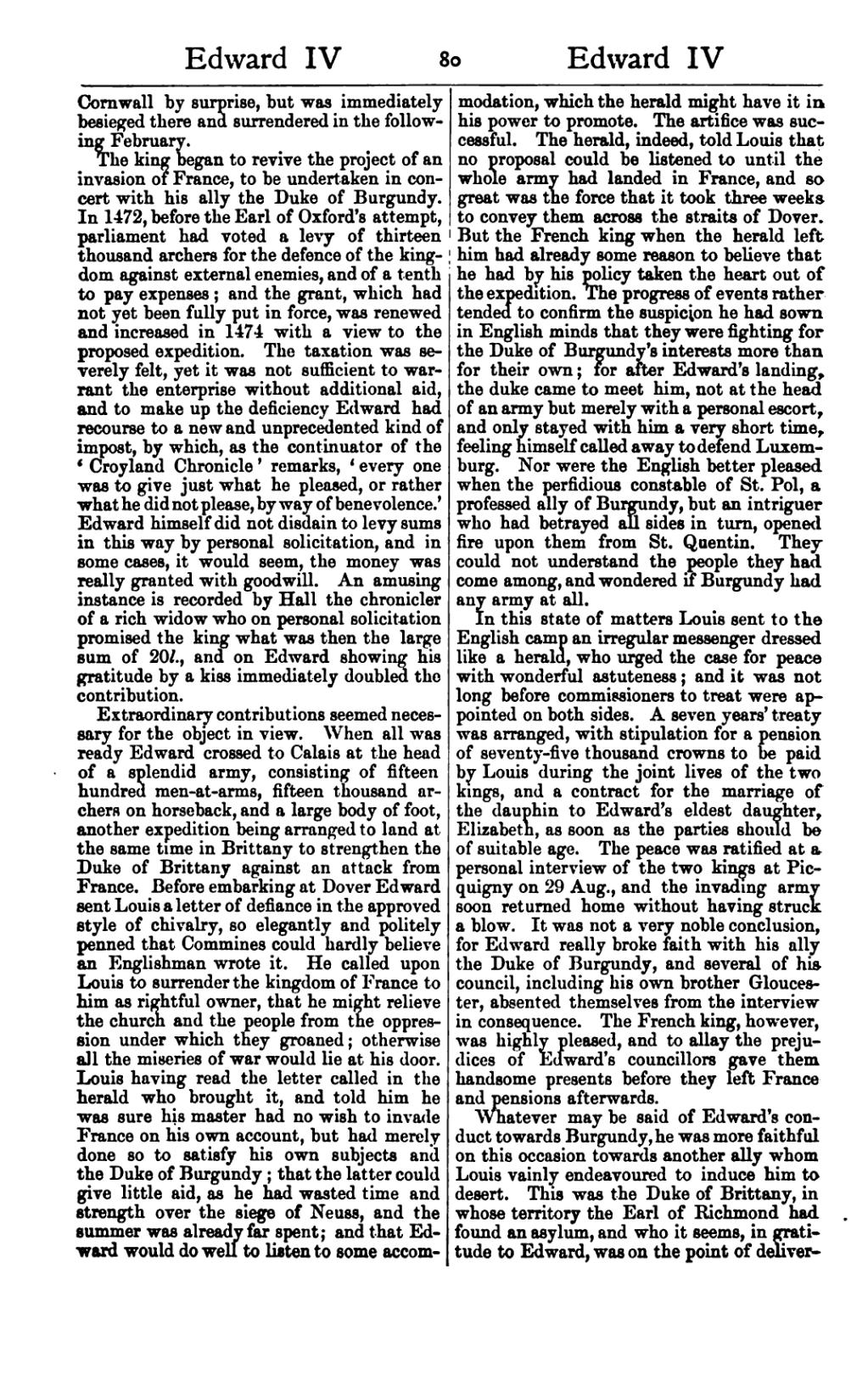Cornwall by surprise, but was immediately besieged there and surrendered in the following February.
The king began to revive the project of an invasion of France, to be undertaken in concert with his ally the Duke of Burgundy. In 1472, before the Earl of Oxford's attempt, parliament had voted a levy of thirteen thousand archers for the defence of the kingdom against external enemies, and of a tenth to pay expenses; and the grant, which had not yet been fully put in force, was renewed and increased in 1474 with a view to the proposed expedition. The taxation was severely felt, yet it was not sufficient to warrant the enterprise without additional aid, and to make up the deficiency Edward had recourse to a new and unprecedented kind of impost, by which, as the continuator of the 'Croyland Chronicle' remarks, 'every one was to give just what he pleased, or rather what he did not please, by way of benevolence.' Edward himself did not disdain to levy sums in this way by personal solicitation, and in some cases, it would seem, the money was really granted with goodwill. An amusing instance is recorded by Hall the chronicler of a rich widow who on personal solicitation promised the king what was then the large sum of 20l., and on Edward showing his gratitude by a kiss immediately doubled the contribution.
Extraordinary contributions seemed necessary for the object in view. When all was ready Edward crossed to Calais at the head of a splendid army, consisting of fifteen hundred men-at-arms, fifteen thousand archers on horseback, and a large body of foot, another expedition being arranged to land at the same time in Brittany to strengthen the Duke of Brittany against an attack from France. Before embarking at Dover Edward sent Louis a letter of defiance in the approved style of chivalry, so elegantly and politely penned that Commines could hardly believe an Englishman wrote it. He called upon Louis to surrender the kingdom of France to him as rightful owner, that he might relieve the churcn and the people from the oppression under which they groaned; otherwise all the miseries of war would lie at his door. Louis having read the letter called in the herald who brought it, and told him he was sure his master had no wish to invade France on his own account, but had merely done so to satisfy his own subjects and the Duke of Burgundy; that the latter could give little aid, as he had wasted time and strength over the siege of Neuss, and the summer was already far spent; and that Edward would do well to listen to some accommodation, which the herald might have it in his power to promote. The artifice was successful. The herald, indeed, told Louis that no proposal could be listened to until the whole army had landed in France, and so great was the force that it took three weeks to convey them across the straits of Dover. But the French king when the herald left him had already some reason to believe that he had by his policy taken the heart out of the expedition. The progress of events rather tended to confirm the suspicion he had sown in English minds that they were fighting for the Duke of Burgundy's interests more than for their own; for after Edward's landings the duke came to meet him, not at the head of an army but merely with a personal escort, and only stayed with him a very short time, feeling himself called away to defend Luxemburg. Nor were the English better pleased when the perfidious constable of St. Pol, a professed ally of Burgundy, but an intriguer who had betrayed all sides in turn, opened fire upon them from St. Quentin. They could not understand the people they had come among, and wondered if Burgundy had any army at all.
In this state of matters Louis sent to the English camp an irregular messenger dressed like a herald, who urged the case for peace with wonderful astuteness; and it was not long before commissioners to treat were appointed on both sides. A seven years' treaty was arranged, with stipulation for a pension of seventy-five thousand crowns to be paid by Louis during the joint lives of the two kings, and a contract for the marriage of the dauphin to Edward's eldest daughter, Elizabeth, as soon as the parties should be of suitable age. The peace was ratified at a personal interview of the two kings at Picquigny on 29 Aug., and the invading army soon returned home without having struck a blow. It was not a very noble conclusion, for Edward really broke faith with his ally the Duke of Burgundy, and several of his council, including his own brother Gloucester, absented themselves from the interview in consequence. The French king, however, was highly pleased, and to allay the prejudices of Edward's councillors gave them handsome presents before they left France and pensions afterwards.
whatever may be said of Edward's conduct towards Burgundy, he was more faithful on this occasion towards another ally whom Louis vainly endeavoured to induce him to desert. This was the Duke of Brittany, in whose territory the Earl of Richmond had found an asylum, and who it seems, in gratitude to Edward, was on the point of deliver-
